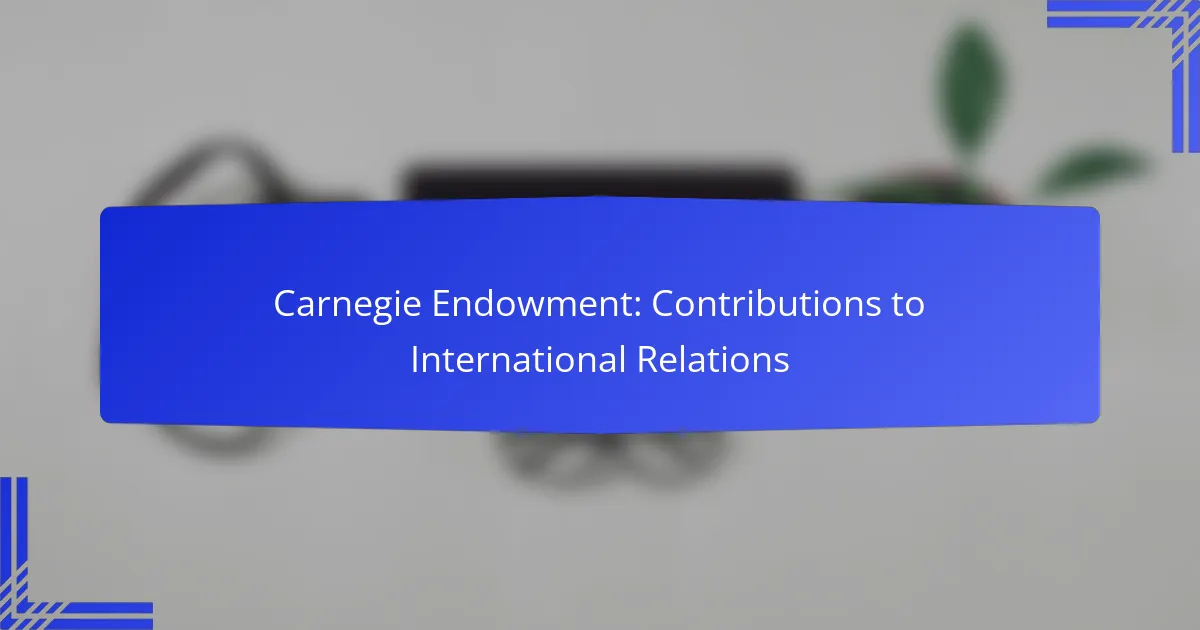The Carnegie Endowment for International Peace has played a pivotal role in shaping international relations through its extensive research, global initiatives, and influential publications. By focusing on critical areas such as conflict resolution, democracy, and international security, it fosters dialogue and provides in-depth analysis essential for addressing global challenges and promoting think tanks in geopolitical analysis.
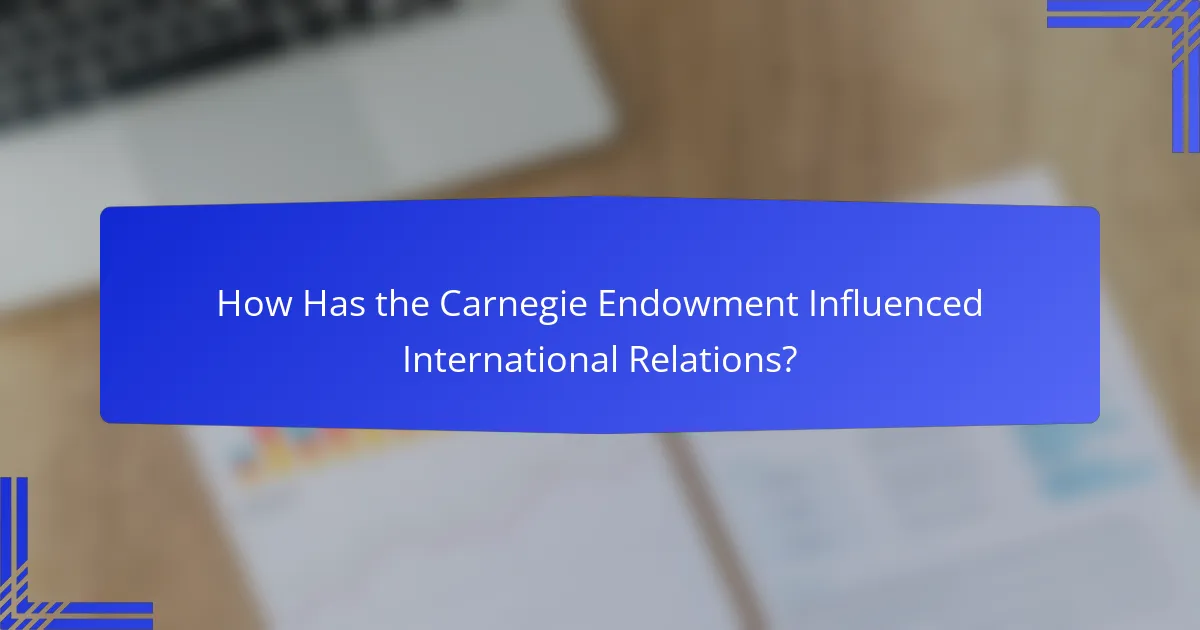
How Has the Carnegie Endowment Influenced International Relations?
The Carnegie Endowment for International Peace has significantly shaped international relations through its research, global initiatives, educational programs, and influential publications. By providing in-depth analysis and fostering dialogue, it has become a key player in addressing global challenges and promoting peace.
Policy research and analysis
The Carnegie Endowment conducts extensive policy research and analysis, focusing on critical issues such as security, governance, and economic development. Its scholars produce reports and policy briefs that offer actionable recommendations for governments and organizations worldwide.
By utilizing a multidisciplinary approach, the Endowment integrates insights from various fields, ensuring comprehensive analysis. This research often influences policymakers, helping them make informed decisions that can lead to more effective international relations.
Global engagement initiatives
The Endowment’s global engagement initiatives aim to foster collaboration among nations and promote dialogue on pressing international issues. These initiatives often involve partnerships with foreign governments, think tanks, and civil society organizations.
Through conferences, workshops, and public events, the Carnegie Endowment facilitates discussions that bridge cultural and political divides. This engagement not only enhances mutual understanding but also encourages cooperative solutions to global challenges.
Educational programs
Carnegie’s educational programs are designed to cultivate the next generation of leaders in international relations. These programs include fellowships, internships, and training sessions that equip participants with the skills needed to navigate complex global landscapes.
By offering opportunities for hands-on experience and mentorship, the Endowment helps young professionals develop a nuanced understanding of international issues, preparing them for impactful careers in diplomacy and policy-making.
Publications and thought leadership
The Carnegie Endowment is renowned for its publications, which include books, articles, and online content that address contemporary international relations topics. These works often reflect cutting-edge research and provide insights from leading experts in the field.
Through its thought leadership, the Endowment shapes public discourse and influences policy debates. Its publications are widely cited by academics, practitioners, and media, reinforcing its role as a trusted source of knowledge in international relations.
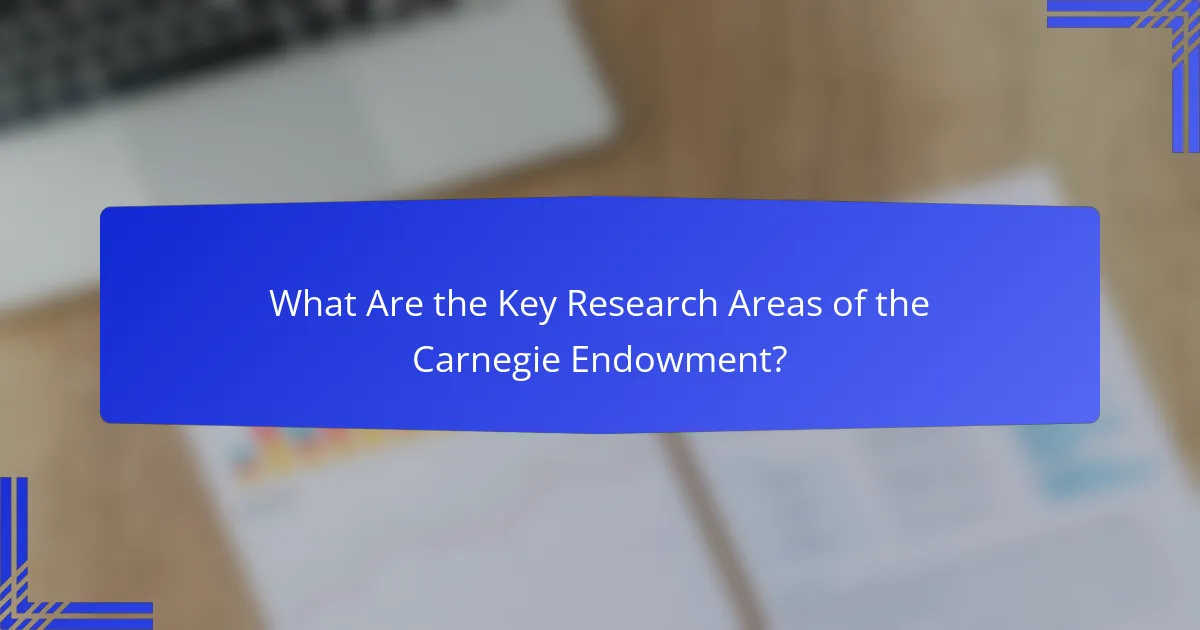
What Are the Key Research Areas of the Carnegie Endowment?
The Carnegie Endowment focuses on several key research areas that shape international relations, including conflict resolution, democracy and governance, international security, and economic policy. Each area is critical for understanding global dynamics and developing effective strategies for engagement and policy-making.
Conflict resolution
Conflict resolution at the Carnegie Endowment involves analyzing the causes of conflict and developing strategies to mitigate and resolve disputes. The approach emphasizes dialogue, negotiation, and mediation as essential tools for peacebuilding.
Practitioners often assess historical conflicts to identify patterns and effective interventions. For instance, utilizing third-party mediation can significantly increase the chances of successful negotiations, especially in protracted disputes.
Democracy and governance
The Carnegie Endowment’s work on democracy and governance focuses on promoting democratic institutions and practices worldwide. This includes research on electoral processes, civil society engagement, and rule of law.
Key considerations involve understanding local contexts and the unique challenges each country faces. For example, supporting independent media can enhance transparency and accountability in governance, fostering a more informed electorate.
International security
International security research at the Carnegie Endowment examines threats to global stability, including terrorism, nuclear proliferation, and cyber threats. The emphasis is on developing comprehensive security strategies that address both traditional and non-traditional threats.
Collaboration with international partners is crucial, as security challenges often transcend national borders. Engaging in multilateral agreements can strengthen collective security measures and enhance regional stability.
Economic policy
The Carnegie Endowment explores economic policy in relation to international relations, focusing on trade, investment, and economic development. Understanding the interplay between economic factors and geopolitical dynamics is essential for effective policymaking.
For instance, analyzing trade agreements can reveal how economic interdependence influences diplomatic relations. Policymakers should consider the potential for economic sanctions or incentives to achieve foreign policy objectives.
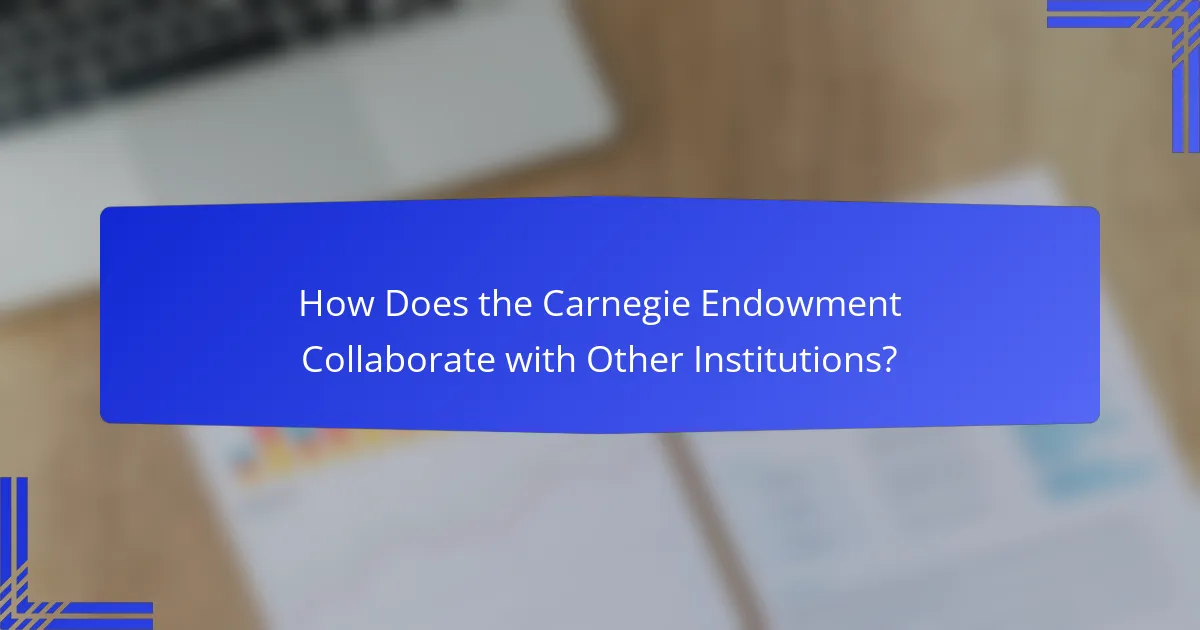
How Does the Carnegie Endowment Collaborate with Other Institutions?
The Carnegie Endowment for International Peace collaborates with various institutions to enhance its research and influence in international relations. These collaborations span partnerships with universities, governments, and non-governmental organizations (NGOs), each contributing unique perspectives and resources.
Partnerships with universities
The Carnegie Endowment partners with universities globally to foster academic research and policy analysis. These partnerships often involve joint research projects, workshops, and seminars that bring together scholars and practitioners to discuss pressing international issues.
For instance, collaborations with institutions such as Stanford University and Georgetown University allow for the exchange of ideas and methodologies, enriching the academic landscape of international relations. Such partnerships can also lead to the development of specialized programs or fellowships that support emerging scholars.
Collaborations with governments
Collaboration with governments is a key aspect of the Carnegie Endowment’s work, as it seeks to inform and influence policy decisions. The Endowment engages with various governmental bodies to provide research-based insights on global challenges, such as security, trade, and climate change.
These collaborations often include advisory roles, where Carnegie experts provide recommendations based on their research. For example, the Endowment has worked with the U.S. State Department to address foreign policy issues, ensuring that academic research informs practical governance.
Engagement with NGOs
The Carnegie Endowment actively engages with non-governmental organizations to amplify its research impact and foster dialogue on international issues. By collaborating with NGOs, the Endowment can reach diverse audiences and advocate for policy changes more effectively.
These engagements may involve joint initiatives, public events, or co-authored reports that highlight critical issues such as human rights, democracy, and conflict resolution. Collaborating with organizations like the International Crisis Group allows the Endowment to leverage grassroots insights and enhance its policy recommendations.
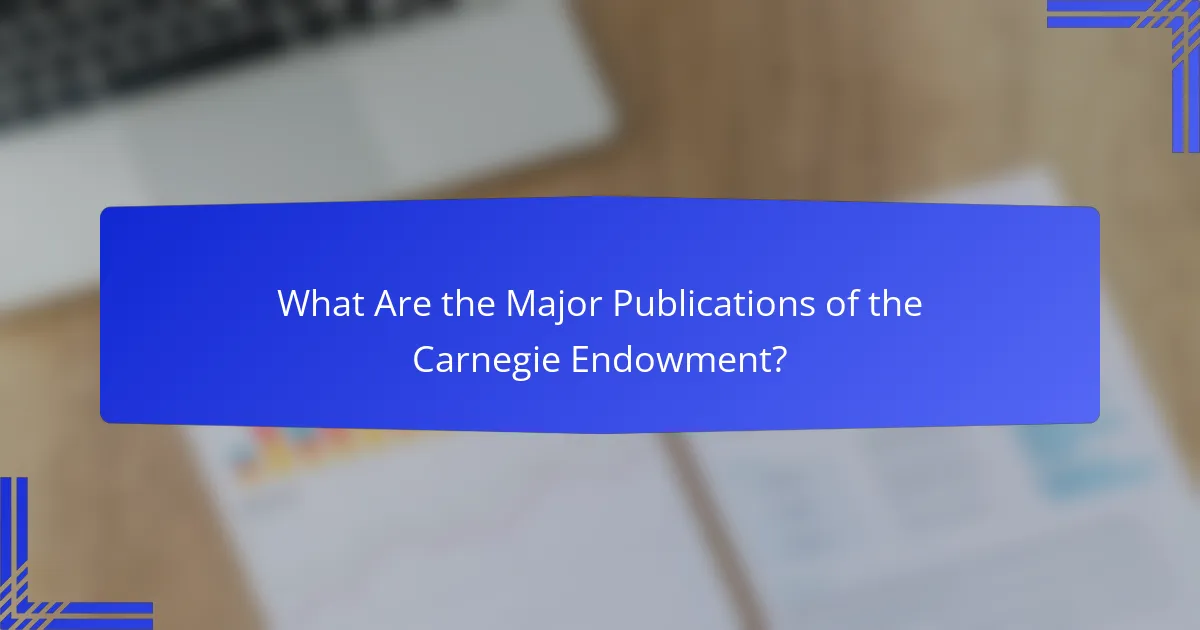
What Are the Major Publications of the Carnegie Endowment?
The Carnegie Endowment for International Peace produces a variety of influential publications that contribute significantly to the field of international relations. These publications include in-depth analyses, policy recommendations, and comprehensive reports aimed at informing policymakers and the public.
Carnegie Papers
Carnegie Papers are detailed research articles that explore specific international issues, providing insights and recommendations based on rigorous analysis. Each paper typically focuses on a single topic, such as security, governance, or economic policy, and is authored by experts in the field.
These papers are designed to inform both academic and policy discussions, often influencing debates on critical global challenges. They are accessible online, allowing a wide audience to engage with the research findings.
Policy briefs
Policy briefs are concise documents that summarize key findings and recommendations from Carnegie’s research. They are aimed at policymakers and practitioners who need quick, actionable insights on pressing international issues.
Typically, a policy brief will highlight the main arguments and suggest specific actions or considerations for decision-makers. These briefs are often used in conjunction with broader reports to distill complex information into digestible formats.
Books and reports
The Carnegie Endowment publishes a range of books and comprehensive reports that delve into various aspects of international relations. These works often compile extensive research and case studies, providing a thorough examination of specific themes or regions.
Books and reports from Carnegie are frequently used as reference materials in academic settings and by practitioners in the field. They contribute to the broader discourse on international relations by presenting well-researched perspectives and fostering informed debate.

What Events Does the Carnegie Endowment Host?
The Carnegie Endowment organizes a variety of events aimed at fostering dialogue and understanding in international relations. These events include conferences, public lectures, and webinars, providing platforms for experts and the public to engage on pressing global issues.
Conferences and workshops
The Carnegie Endowment hosts numerous conferences and workshops that bring together scholars, policymakers, and practitioners. These events typically focus on specific themes such as security, economic policy, or climate change, allowing for in-depth discussions and networking opportunities.
Participants can expect to engage in panel discussions, breakout sessions, and collaborative workshops designed to generate actionable insights. Attendees often include influential figures from government, academia, and the private sector, making these events valuable for anyone looking to deepen their understanding of international relations.
Public lectures
Public lectures at the Carnegie Endowment feature prominent speakers who share their expertise on various international topics. These lectures are open to the public and often include a Q&A session, encouraging audience interaction and engagement.
Topics can range from geopolitical analysis to discussions on human rights, offering attendees a chance to hear directly from experts and thought leaders. These events are typically free or low-cost, making them accessible to a broad audience interested in global affairs.
Webinars and online discussions
In response to the growing demand for virtual engagement, the Carnegie Endowment has expanded its offerings to include webinars and online discussions. These digital events allow participants from around the world to join in real-time discussions on pressing international issues.
Webinars often feature expert panels and interactive elements, such as polls and live Q&A sessions. This format not only increases accessibility but also fosters a global dialogue, enabling diverse perspectives to be shared and considered.
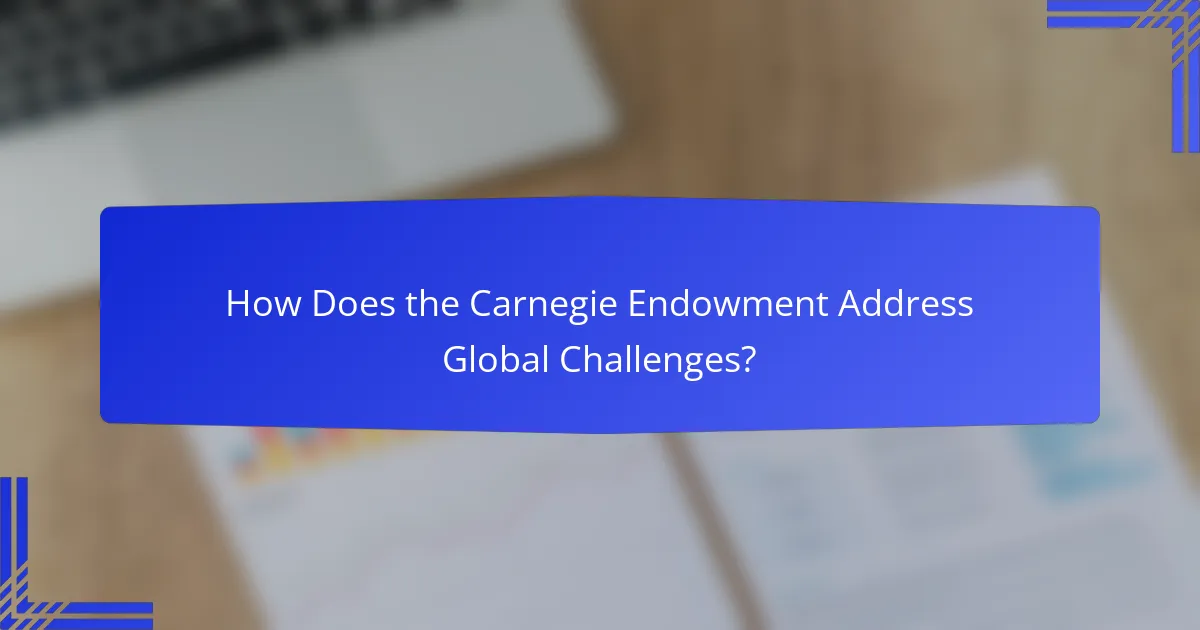
How Does the Carnegie Endowment Address Global Challenges?
The Carnegie Endowment for International Peace tackles global challenges through research, policy analysis, and advocacy. By fostering dialogue and collaboration among policymakers, scholars, and the public, it aims to develop solutions to pressing international issues.
Research and Analysis
The Carnegie Endowment conducts in-depth research on a variety of global issues, including security, economic policy, and climate change. Its experts produce reports, articles, and policy briefs that provide insights and recommendations for decision-makers. This research is often grounded in empirical data and case studies, making it relevant and actionable.
For instance, studies on nuclear non-proliferation inform international treaties and negotiations, while analyses of economic trends guide policymakers in addressing global financial crises. The Endowment’s work is widely cited by governments and institutions, enhancing its influence in shaping international relations.
Global Engagement
Engagement is a key strategy for the Carnegie Endowment, as it organizes events, forums, and discussions that bring together diverse stakeholders. These gatherings facilitate the exchange of ideas and promote understanding among different cultures and political systems. By connecting experts and practitioners from various fields, the Endowment helps to bridge gaps in knowledge and foster collaborative solutions.
For example, the Endowment often hosts international conferences that focus on specific challenges, such as cybersecurity or climate policy. These events not only highlight pressing issues but also encourage joint initiatives among countries and organizations.
Policy Advocacy
The Carnegie Endowment actively advocates for policies that address global challenges. Its team works closely with government officials, NGOs, and international organizations to promote evidence-based solutions. This advocacy is informed by the research conducted by the Endowment, ensuring that recommendations are grounded in solid analysis.
Common areas of focus include arms control, trade policy, and human rights. By leveraging its expertise and networks, the Endowment aims to influence legislation and international agreements that shape the global landscape.
